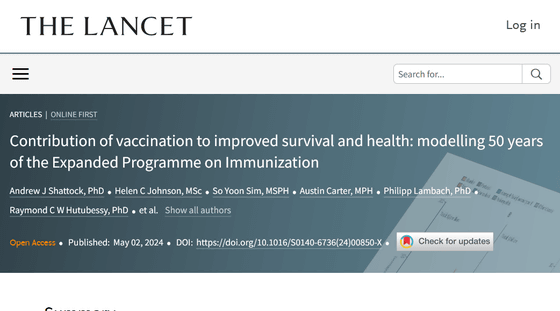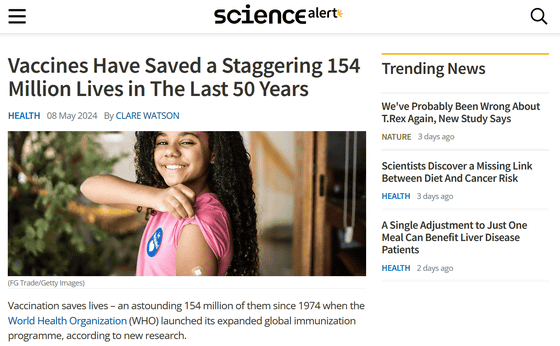It is clear that vaccination has saved 154 million lives over the past 50 years

A study by more than 20 medical researchers has revealed that in the 50 years since the World Health Organization (WHO) launched the Expanded Programme on Immunisation (EPI) in 1974, vaccinations have saved 154 million lives. The majority of the lives saved in those 50 years were children under the age of five, who benefited especially from the measles vaccine.
Contribution of vaccination to improved survival and health: modelling 50 years of the Expanded Programme on Immunization - The Lancet
https://www.thelancet.com/journals/lancet/article/PIIS0140-6736(24)00850-X/fulltext

Vaccines Have Saved a Staggering 154 Million Lives in the Last 50 Years: ScienceAlert
https://www.sciencealert.com/vaccines-have-saved-a-staggering-154-million-lives-in-the-last-50-years

Vaccination protects not only the person who receives it, but also those in the community who are vulnerable to infectious diseases, such as children, the elderly, and those with weakened immune systems. According to the research team, in the 50 years since the WHO began its vaccination program in 1974, 154 million lives have been saved, the majority of which were children under the age of 5. In addition, 60% of the total benefits of vaccination over the 50 years were due to the measles vaccine.

As this study shows, vaccination has great benefits, but in recent years, there has been global concern about declining vaccination rates. In 2021, the number of children who had not received the measles vaccine reached a record high , and measles outbreaks occurred around the world. The research team points out that 'complacency and indifference' rather than vaccine hesitancy are the causes of declining vaccination rates.
When vaccines are effective at preventing disease, cases and epidemics decrease, but as cases decrease, people tend to forget the risks of not vaccinating - in some ways, vaccines become a victim of their own success.
The only infectious disease to have been eradicated by vaccination is smallpox, with the last confirmed case of natural infection occurring in 1977. It has also been reported that vaccination against the human papillomavirus (HPV), which causes cervical cancer, has resulted in no cervical cancer being detected among teenagers vaccinated in Scotland.

The study also showed that vaccination was responsible for 40% of the decline in infant mortality. For each life saved by vaccination, an average of 66 years of healthy life were gained, translating into a total of 10.2 billion years of healthy life that have not been lost.
It is also important to keep your vaccinations up to date even in adulthood. In recent years, a link between viral infections such as influenza and shingles and the risk of developing dementia has been pointed out . Although vaccines cannot prevent all infectious diseases, they can significantly reduce the risk of severe illness and hospitalization, which may ultimately lead to the prevention of neurodegenerative diseases.
As medical researchers around the world work to improve vaccine development and experiment with new vaccine technologies to protect us from more infectious diseases and cancers, the research team reaffirms the importance of vaccination and calls for further efforts to increase vaccination rates.
Related Posts:
in Science, Posted by log1i_yk







